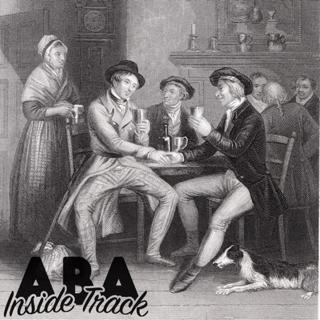
Episode 1012 - (UNLOCKED) Acceptance and Commitment Therapy for Behavior Analysts Book Club
UNLOCKED from our Patreon page, it’s the “Acceptance and Commitment Therapy for Behavior Analysts” Book Club! Interested in more Book Clubs? Want to vote on what we read next? Feeling FOMO at getting this a full year late? Wish your 2 CEs for listening to the episode were FREE??? Join us on Patreon to get all of our episodes a week early, access to these bonus episodes, plus other goodies. While we've covered acceptance and commitment therapy a few times before, we'd never really dug too deeply into exactly HOW ACT is behavior analytic. As in the exact mechanisms by which the fabulous steps of the hexaflex "work" as described in 100% behavioral terms. Now, thanks to our listeners (and book authors Dixon, Hayes, and Belisle), we can! Join us as we learn about ACT from theory to practice in our two-hour discusion of "Acceptance and Commitment Therapy for Behavior Analysts". Plus, you'll finally get to discover which branch of the hexaflex is our all-time favorite! Is it acceptance? Committed action? Self-as context? No, no one likes self-as context. This episode is available for 2.0 LEARNING CEUs. Content discussed in this episode: Dixon, M.R., Hayes, S.C., & Belisle, J. (2023). Acceptance and commitment therapy for behavior analysts: A practice guide from theory to treatment. Routledge. If you're interested in ordering CEs for listening to this episode, click here to go to the store page. You'll need to enter your name, BCBA #, and the two episode secret code words to complete the purchase. Email us at abainsidetrack@gmail.com for further assistance. Want these CEs for FREE? Just subscribe to our Patreon at the $10+ levels and go to the original post for a discount code.
12 Feb 1h 57min

February 2025 Preview
If podcasts are a box of chocolates and behavior analysis is flowers, I guess that makes you our Valentine. We kick off the shortest of months with a check-in with the crew and a review of what’s coming out in time for President’s Day. First, after a year in the vault, our last year’s book club on ACT is unlocked and on the loose. Then the listener’s take the stage with their vote for an episode on procedural integrity. Finally, we try something different with a brand new recording of one of our previous conference talks on the ethics of collaboration. It’s like you were at the conference…but now it’s a podcast episode! Articles for February 2025 (UNLOCKED) Acceptance and Commitment Therapy Book Club Dixon, M.R., Hayes, S.C., & Belisle, J. (2023). Acceptance and commitment therapy for behavior analysts: A practice guide from theory to treatment. Routledge. (LISTENER CHOICE) Tutorial - Procedural Integrity Bergmann, S., Harman, M.J., Brand, D., & Vladescu, J.C. (2024). A survey of procedural-fidelity data collection in behavior-analytic practice. Behavior Analysis in Practice. doi: 10.1007/s40617-024-00995-1 Morris, C., Jones, S.H., & Oliveira, J.P. (2024). A practitioner’s guide to measuring procedural fidelity. Behavior Analysis in Practice, 17, 643-655. doi: 10.1007/s40617-024-00910-8 Al-Nasser, T., Williams, W.L., & Feeney, B. (2019). A brief evaluation of a pictorially enhanced self-instruction packet on participant fidelity across multiple ABA procedures. Behavior Analysis in Practice, 12, 387-395. doi: 10.1007/s40617/018-00282-w The Ethics of Collaboration Bowman, K.S., Suarez, V.D., & Weiss, M.J. (2021). Standards for interprofessional collaboration In the treatment of individuals with autism. Behavior Analysis in Practice, 14, 1191-1208. doi: 10.1007/s40617-021-00560-0 Gasiewski, K., Weiss, M.J., Leaf, J.B., & Labowitz, J. (2021). Collaboration between behavior analysts and occupational therapists in autism service provision: Bridging the gap. Behavior Analysis in Practice, 14, 1209-1222. doi: 10.1007/s40617-021-00619-y LeBlanc, L.A., Onofrio, O.M., Valentino, A.L., & Sleeper, J.D. (2020). Promoting ethical discussions and decision making in a human service agency. Behavior Analysis in Practice, 13, 905-913. doi: 10.1007/s40617-020-00454-7 Brodhead, M.T. (2015). Maintaining professional relationships in an interdisciplinary setting: Strategies for navigating nonbehavioral treatment recommendations for individuals with autism. Behavior Analysis in Practice, 8, 70-28. doi: 10.1007/s40617-015-0042-7
5 Feb 20min

Episode 300 - Vaccines Do Not Cause Autism
Can you believe we made it all the way to episode 300? Well, we decided to cap off the event by revisiting a topic that was in the headlines way back when the three of us started in the field of behavior analysis…and sadly is STILL a topic of discussion: Vaccines and autism. And while the findings are in the title (they don’t), we review the research as to why there is still any discussion on the matter and reflect on whether approaching the anti-vaccine debate from a purely scientific findings lens might be playing into an ableist narrative that paradoxically feeds the misinformation discourse. Thanks to everyone for supporting our show for all these years (and special thanks to everyone who joined us at our live recording!). This episode is available for 1.0 LEARNING CEU. Articles discussed this episode: Ahearn, W.H. (2010). What every behavior analyst should know about the “MMR causes autism” hypothesis. Behavior Analysis in Practice, 3, 46-52. doi: 10.1007/BF03391757 Deer, B. (2011). How the case against the MMR vaccine was fixed. The BMJ, 342:c5347. doi: 10.1136/bmj.c5347 Taylor, L.E., Swerdfeger, A.L., & Eslick, G.D. (2014). Vaccines are not associated with autism: An evidence-based meta-analysis of case-control and cohort studies. Vaccine, 32, 3623-2629. doi: 10.1016/j.vaccine.2014.04.085 Alvik-Harju, C. (2024). Finding more constructive ways forward in the debate over vaccines with increased disability cultural competence. Med Humanit, 49, 9-16. doi: 10.1136/medhum-2021-012342 If you're interested in ordering CEs for listening to this episode, click here to go to the store page. You'll need to enter your name, BCBA #, and the two episode secret code words to complete the purchase. Email us at abainsidetrack@gmail.com for further assistance.
29 Jan 1h 14min

Episode 299 - Collaborative Problem Solving
Despite living more solidly in the psychology domain, Collaborative Problem Solving (CPS) as a treatment for oppositional behaviors is increasingly moving into the mainstream. But does its attempts to change behavior patterns make it behavior analytic or something else? In this episode we look at a few of the earliest studies to evaluate the efficacy of CPS as well as some of the more recent publications on CPS as a treatment for challenging behavior and to discuss just what it is and whether you should be paying attention. But will we answer the key question: Is studying CPS an avenue of collaboration between behavior analysis and psychology or a watered-down version of older behavioral treatments? This episode is available for 1.0 LEARNING CEU. Articles discussed this episode: Greene, R.W., Ablon, J.S., & Goring, J.C. (2003). A transactional model of oppositional behavior: Underpinnings of the Collaborative Problem Solving approach. Journal of Psychosomatic Research, 55, 67-75. doi: 10.1016/S0022-3999(02)00585-8 Greene, R.W., Ablon. J.S., Goring, J.C., Raezer-Blakely, L., Markey, J., Monuteaux, M.C., Henin, A., Edwards, G., & Rabbit, S. (2004). Effectiveness of Collaborative Problem Solving in affectively dysregulated children with oppositional-defiant disorder: Initial findings. Journal of Consulting and Clinical Psychology, 72, 1157-1164. doi: 10.1037/0022-006X.72.6.1157 Pollastri, A.R., Wang, L., Eddy, C.J., & Ablon, J.S. (2023). An open trial of Collaborative Problem Solving in a naturalistic outpatient setting. Clinical Child Psychology and Psychiatry, 28, 512-524. doi: 10.1177/13591045221094387 Stoll, S.J., Hartman, J.D., Paxton, D., Wang, L., Ablon, J.S., Perry, B.D., & Pollastri, A.R. (2023). De-implemnting a point and level system in youth residential care without increased safety risk: A case study. Residential Treatment for Children and Youth. doi: 10.1080/0886571X.2023.2233408 If you're interested in ordering CEs for listening to this episode, click here to go to the store page. You'll need to enter your name, BCBA #, and the two episode secret code words to complete the purchase. Email us at abainsidetrack@gmail.com for further assistance.
22 Jan 1h 10min

Episode 298 - Auld Bag Syne (Winter 2025 Grab Bag)
VERSE Should old research articles be forgot, and never brought to ABA podcasts? Should old research articles be forgot, and auld bag syne? CHORUS For auld bag syne, my BCBAs, for auld bag syne, we’ll take a cup of dissemination yet, for auld bag syne. This episode is available for 1.0 LEARNING CEU. Articles discussed this episode: Graham, S., Keenan, M., & Dillenburger, K. (2024). All for one and one for all: The good inclusion game. Behavioral Interventions. doi: 10.1002/bin.2048 Migan-Gandonou Horr, J. & Campos, C. (2024). Effects of a technology‐based self‐management intervention on social media use in a college student. Behavior Analysis in Practice. doi: 10.1007/s40617-024-00977-3 Schmidt, J., Krantz, J., King, H., Vetter, J., & Maruska, C. (2024). Using a brief experimental analysis for writing speed intervention identification. Behavioral Interventions, 39. doi: 10.1002/bin.2019 If you're interested in ordering CEs for listening to this episode, click here to go to the store page. You'll need to enter your name, BCBA #, and the two episode secret code words to complete the purchase. Email us at abainsidetrack@gmail.com for further assistance.
15 Jan 1h 3min

Episode 297 - Matching Law
Despite being a cornerstone of the science of behavior, we’ve gone nearly 300 episodes without ever really delving into the details of the matching law. Maybe it’s because it involves too many equations. Maybe it’s because a lot of the research seems to focus exclusively on choice in basketball shots. In any case we’re getting every up to speed on the basics of the matching law and its importance in studying choice. Plus, Rob has spicy hot takes. Sweet sassy mo-lassy! This episode is available for 1.0 LEARNING CEU. Articles discussed this episode: Reed, D.D. & Kaplan, B.A. (2011). The matching law: A tutorial for practitioners. Behavior Analysis in Practice, 4, 15-24. doi: 10.1007/BF03391780 Alferink, L.A., Critchfield, T.S., Hitt, J.L., & Higgins, W.J. (2009). Generality of the matching law as a descriptor of shot selection in basketball. Journal of Applied Behavior Analysis, 42, 595-608. doi: 10.1901/jaba.2009.42-595 Morris, S.L. & Vollmer, T.R. (2022). The matching law provides a quantitative description of social time allocation in children with autism. Journal of Applied Behavior Analysis, 55, 934-957. doi: 10.1002/jaba.934 If you're interested in ordering CEs for listening to this episode, click here to go to the store page. You'll need to enter your name, BCBA #, and the two episode secret code words to complete the purchase. Email us at abainsidetrack@gmail.com for further assistance.
8 Jan 1h 16min

PREVIEW - The Science of Consequences Book Club
Enjoy a short preview of our latest full-length Book Club episode. Want to hear the whole thing and get 2.5 CEs for FREE? Subscribe to our Patreon today at the premium $10+ levels for that plus other bonuses! As a follow-up from our episode on storytelling, we our Winter 2024 Book Club explored Dr. Susan Schneider’s 2012 opus, The Science of Consequences, as an example of taking the hugely important concept of learning through consequences and making it understandable to the wider public. But hey, while she was at it, why not explain how consequences impact evolution, or gene expression, or social improvement strategies. And add multiple examples of how consequences work in labs and the natural environment across a wide range of human and non-human species. And make it fun to read! But before our crack Book Club squad dives into the nitty gritty of the content, we had the opportunity to sit down with Dr. Schneider herself to ask how she managed to take millions of years of the effects of consequences and pack it into a 300+ page book as well as how her study of consequences informs her current work as a climate change policy advocate. This full version of this episode is available for 2.5 LEARNING CEUs. Content discussed in this episode: Schneider, S.M. (2012). The science of consequences: How they affect genes, change the brain, and impact our world. Prometheus Books.
3 Jan 56min

January 2025 Preview
As our resolution for the new year, we decided to record 300 podcast episodes. And wouldn’t you know it: We’re almost there! Kick off 2025 by learning about the, surprisingly, never-before discussed on the show matching law! Then we blast off into a more recent development by reviewing research on Collaborative Problem Solving before settling down for a wintry Grab Bag jamboree. And speaking of jamborees, we release our 300th episode on the always relevant topic, vaccines not causing autism. Want to see ABA Inside Track celebrate the 300th episode milestone in person? Join us on Thursday, January 9th, 2025 from 5-7pm EST at Regis College for a full-length live recording, food, our typical brand of shenanigans, and a free CE. Click here to RSVP. Articles for January 2025 Matching Law Reed, D.D. & Kaplan, B.A. (2011). The matching law: A tutorial for practitioners. Behavior Analysis in Practice, 4, 15-24. doi: 10.1007/BF03391780 Alferink, L.A., Critchfield, T.S., Hitt, J.L., & Higgins, W.J. (2009). Generality of the matching law as a descriptor of shot selection in basketball. Journal of Applied Behavior Analysis, 42, 595-608. doi: 10.1901/jaba.2009.42-595 Morris, S.L. & Vollmer, T.R. (2022). The matching law provides a quantitative description of social time allocation in children with autism. Journal of Applied Behavior Analysis, 55, 934-957. doi: 10.1002/jaba.934 Auld Bag Syne (Winter 2025 Grab Bag) Graham, S., Keenan, M., & Dillenburger, K. (2024). All for one and one for all: The good inclusion game. Behavioral Interventions. doi: 10.1002/bin.2048 Migan-Gandonou Horr, J. & Campos, C. (2024). Effects of a technology‐based self‐management intervention on social media use in a college student. Behavior Analysis in Practice. doi: 10.1007/s40617-024-00977-3 Schmidt, J., Krantz, J., King, H., Vetter, J., & Maruska, C. (2024). Using a brief experimental analysis for writing speed intervention identification. Behavioral Interventions, 39. doi: 10.1002/bin.2019 Collaborative Problem Solving Greene, R.W., Ablon, J.S., & Goring, J.C. (2003). A transactional model of oppositional behavior: Underpinnings of the Collaborative Problem Solving approach. Journal of Psychosomatic Research, 55, 67-75. doi: 10.1016/S0022-3999(02)00585-8 Greene, R.W., Ablon. J.S., Goring, J.C., Raezer-Blakely, L., Markey, J., Monuteaux, M.C., Henin, A., Edwards, G., & Rabbit, S. (2004). Effectiveness of Collaborative Problem Solving in affectively dysregulated children with oppositional-defiant disorder: Initial findings. Journal of Consulting and Clinical Psychology, 72, 1157-1164. doi: 10.1037/0022-006X.72.6.1157 Pollastri, A.R., Wang, L., Eddy, C.J., & Ablon, J.S. (2023). An open trial of Collaborative Problem Solving in a naturalistic outpatient setting. Clinical Child Psychology and Psychiatry, 28, 512-524. doi: 10.1177/13591045221094387 Stoll, S.J., Hartman, J.D., Paxton, D., Wang, L., Ablon, J.S., Perry, B.D., & Pollastri, A.R. (2023). De-implemnting a point and level system in youth residential care without increased safety risk: A case study. Residential Treatment for Children and Youth. doi: 10.1080/0886571X.2023.2233408 Vaccines Do Not Cause Autism Ahearn, W.H. (2010). What every behavior analyst should know about the “MMR causes autism” hypothesis. Behavior Analysis in Practice, 3, 46-52. doi: 10.1007/BF03391757 Deer, B. (2011). How the case against the MMR vaccine was fixed. The BMJ, 342:c5347. doi: 10.1136/bmj.c5347 Taylor, L.E., Swerdfeger, A.L., & Eslick, G.D. (2014). Vaccines are not associated with autism: An evidence-based meta-analysis of case-control and cohort studies. Vaccine, 32, 3623-2629. doi: 10.1016/j.vaccine.2014.04.085 Alvik-Harju, C. (2024). Finding more constructive ways forward in the debate over vaccines with increased disability cultural competence. Med Humanit, 49, 9-16. doi: 10.1136/medhum-2021-012342
1 Jan 34min






















